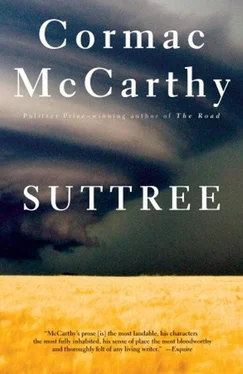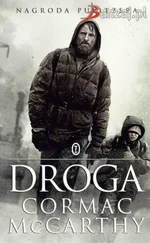Cormac McCarthy - Suttree
Здесь есть возможность читать онлайн «Cormac McCarthy - Suttree» весь текст электронной книги совершенно бесплатно (целиком полную версию без сокращений). В некоторых случаях можно слушать аудио, скачать через торрент в формате fb2 и присутствует краткое содержание. Год выпуска: 1992, Издательство: Vintage International, Жанр: Современная проза, на английском языке. Описание произведения, (предисловие) а так же отзывы посетителей доступны на портале библиотеки ЛибКат.
- Название:Suttree
- Автор:
- Издательство:Vintage International
- Жанр:
- Год:1992
- ISBN:нет данных
- Рейтинг книги:5 / 5. Голосов: 1
-
Избранное:Добавить в избранное
- Отзывы:
-
Ваша оценка:
- 100
- 1
- 2
- 3
- 4
- 5
Suttree: краткое содержание, описание и аннотация
Предлагаем к чтению аннотацию, описание, краткое содержание или предисловие (зависит от того, что написал сам автор книги «Suttree»). Если вы не нашли необходимую информацию о книге — напишите в комментариях, мы постараемся отыскать её.
Suttree — читать онлайн бесплатно полную книгу (весь текст) целиком
Ниже представлен текст книги, разбитый по страницам. Система сохранения места последней прочитанной страницы, позволяет с удобством читать онлайн бесплатно книгу «Suttree», без необходимости каждый раз заново искать на чём Вы остановились. Поставьте закладку, и сможете в любой момент перейти на страницу, на которой закончили чтение.
Интервал:
Закладка:
I’ll see what I can do, said Suttree. He eased his way around the edge of these half addled aged and rumsoaked dotards and ascended the stairs.
Muted light fell through a window at the end of the hall The doors had all been unpinned from their hinges and taken away. Suttree peered into an old boudoir with mattresses along the walls. Tattered gray army blankets. A thin little man was squatting by the window masturbating. He did not take his eyes from Suttree nor did he cease pulling at his limp and wattled cock. It was deadly cold in the room, Suttree turned and went back and down the stairs.
Mrs Rufus opened the door.
Cold enough for you? said Suttree.
She motioned him in.
Harrogate was sitting by the stove with a parcel of blacks all of whom were drunk or working at it. When Harrogate turned and raised his head Suttree saw that the city rat himself was reeling.
How the hell did you manage to get drunk this quick? he said.
Drinkin whiskey is how. Have a goddamn drink Sut. Give him a drink Cleo.
An angular black with splayed teeth held forth a quart picklejar half full of splo. Suttree waved it away.
Where’s Rufus?
He aint here.
I can see that.
I told that fool not to give him none of that whiskey, said Mrs Rufus from behind him in a muted shriek.
I never poured it down his thoat, said a dark dwarf by the stove-door.
Suttree looked around. Well fuck it, he said.
Who is this cat? said a tawny freckled halfbreed. Small skull covered with snips of copper wire.
He’s cool man, he’s cool, said Harrogate, having fallen easily into the way of things.
Suttree turned and went out. He pulled the door to behind him and went on along the little cinder path past the hoglot, a pair of snouts working in the fence mesh to get the wind of him. Long ears tilting, pale eyes watching from their purlieu of frozen mire. He went out to the road and across the viaduct toward town. The lightest rain of soot was falling and a handful of small birds flared suddenly about him, moving through the bitter air with a faint rasping sound. Suttree looked down at the blackwater creek swirling below, the gray panes of scalloped ice. He went on toward the town, a colorless world this winter afternoon where all things bear that grainy look of old films and the buildings rise into an obscurity prophetic and profound.
He went up Central, slumped and hands deeply pocketed. An eyeless beggar addled with the cold sat in the empty feastday street singing a canticle to his eternal night and holding out a simple frozen claw for whatever might fall almswise. Suttree hawked up and thooked forth a clot of phlegm against a boarded storewindow and started across the street. As he did so his eye fell on a cartoken in the gutter. He bent to claim it. Small brass coin stamped through with a K. He crossed the street and swung up through the open door of a standing trolley and dropped the coin in the glass cage and went down the aisle. The driver watched him in the mirror. Suttree eased himself into the cold leather seat and looked out.
Lights came on above the shops, a neon sign here, sudden paltry spanglements against the bluegray dusk. A fabled miscellany in this pawnshop window. The door clattered and hushed shut and the trolley lurched forward. The pale domes of light in the clerestory waxed more yellow. The seats to the front of the streetcar were vacant yet two blacks hung by one arm each like gibbons from the chrome rail overhead and swayed with the gathering speed. With the heel of his hand Suttree cleared a small window in the frosted glass and peered out at the few figures receding along the walks. Fellow citizens in this bewintered city. A passing rack of hot neon washed his own sad countenance from the glass. He leaned his head against the cold pane, watching pedestrians toil from pool to pool of lamplight, trailing wisps of vapor, bent figures, homebound. He could smell the old varnished wood of the sash and the brass of the catches. The trolley slowed, surged forth again. Cars passed below, a rumpling sound of tires over the bricks. The buildings dropped away. They were going by a frozen mudflat, lunar, naked, spoored with fossil dogtracks. Under the billboard lights small sprawling mica constellations.
The lightwires slung past in shallow convections pole to pole and the loneliness rode in his stomach like an egg.
Bell ching. This archaic craft grinding to a halt. People shuffling out through the folding door. A wet pneumatic hiss, clanking into motion once again. Your face among the brown bags old lady. Waiting to cross. Blinking at the transit of these half empty frames slapping past. Beyond in a yellowlit housewindow two faces fixed aspectant and forever in some domestic vagary. Rapid his progress who petrifies these innocents into stony history.
They swung past the deserted park, the midway, the ferriswheel like a bumtout armature standing black and cold against the farther streetlamps. The trolley heeled hard by a brick wall and went rattling down an alleyway where scrawled fucks in rainwashed chalk flashed past the window under the crackling blue stroboscope of the antenna. They wheeled through a long carbarn and pulled to a stop with dimming lights.
End of the line, buddy, the driver called back.
I’ll just ride on back to town with you, Suttree said.
Well you’ll have to come up here and put a token in the box.
I thought you could ride as far as you wanted on one token.
Not on this streetcar.
Suttree rose and made his way down the aisle, his eye studying the floor for a chance of coin or token among the matchstems and gum wrappers. Listen, he said, cant I just ride on back?
Fares is one way, said the driver.
I dont have another token.
They’re five for thirty cents. Or you can put in a dime.
I dont have any money.
Oh well, said the driver. He reached and got his little leather bag and rose. This would be a pleasant world if everybody could just ride and ride.
He descended the steps with his satchel and crossed through the dim electric gloom of the terminal toward the dispatch office. Suttree went out to the street.
A few carlights came owllike from the murk and receded. He stood beneath a streetlamp with his thumb out. In his thin coat he was cold to the bone in moments. The streetcar hove from the carbarn and sucked by the soft yellow bore of the headlamp went trundling past. Blacks nodding in their windowstrips. A trolley of dolls or frozen dead.
Suttree with one foot in the gutter glared numbly after the helmless driver and the springworn trucks moaned and lolled on their shackles and a blue tailstar clicked along the wires and the trolley drew away into the night. He gripped his thighs through his threadbare pockets and set off along the weedy walkway. The lights of Knoxville quaked in a faint penumbra to the west as must the ruins of many an older city seen by herders in the hills, by barbaric tribesmen shuffling along the roads. Suttree with his miles to go kept his eyes to the ground, maudlin and muttersome in the bitter chill, under the lonely lamplight.
12
The old railroader had a fire going in the little iron stove and he’d pulled his bed crosswise before it for warmth. Suttree slid the door shut. Back down the tracks the gray ruins of summer weeds looked wrinkled and very old.
Come set by the fire, the old man said. I didnt know it was so cold.
I’ve brought it all inside with me. How have you been?
Mean as ever. How you makin it?
I’m about froze out. Thought I’d better check on you to see were you still living.
The old man chuckled to himself. Well lord, he said. A little cold wont kill me I dont reckon. Set down.
He raised himself up slightly and rocked to one side as if he would make room and then subsided in the same place. Suttree sat on the edge of the bunk. Strangely like his own. The rough army blanket. The old man had been reading a coverless book and he laid it down and removed his glasses and pinched the bridge of his nose. A small desk stood against the wall and in the pigeonholes were yellowed timetables, waybills and tare sheets. In the far corner a great stack of old newsprint and magazines. The old man’s eyes must have followed his. I give up on the newspapers, he said.
Читать дальшеИнтервал:
Закладка:
Похожие книги на «Suttree»
Представляем Вашему вниманию похожие книги на «Suttree» списком для выбора. Мы отобрали схожую по названию и смыслу литературу в надежде предоставить читателям больше вариантов отыскать новые, интересные, ещё непрочитанные произведения.
Обсуждение, отзывы о книге «Suttree» и просто собственные мнения читателей. Оставьте ваши комментарии, напишите, что Вы думаете о произведении, его смысле или главных героях. Укажите что конкретно понравилось, а что нет, и почему Вы так считаете.












